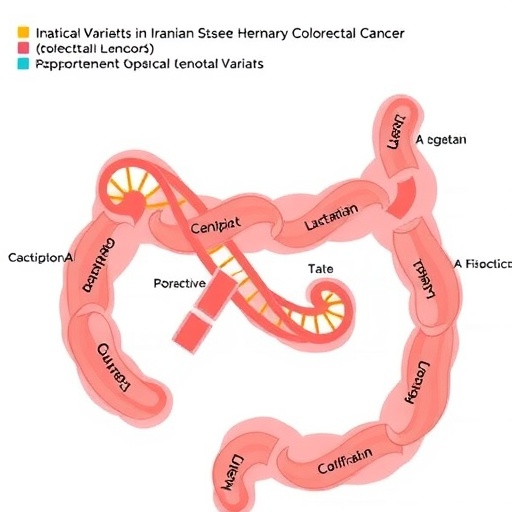In a groundbreaking study published in Cancer Cell International, researchers have unveiled critical insights into hereditary colorectal cancer (CRC) through the identification of germline variants in patients enrolled in the Iranian Hereditary Colorectal Cancer Registry (IHCCR). This research comes at a time when understanding the genetic underpinnings of cancer is paramount for improving preventative strategies and treatment options.
Colorectal cancer is a significant health issue worldwide, with hereditary cancer syndromes contributing to approximately 6–10% of all cases. Furthermore, around 20% of early-onset CRC cases can be attributed to hereditary factors. The identification of novel pathogenic germline variants carries profound implications, not only enhancing the specificity of genetic testing but also improving counseling and surveillance approaches for at-risk individuals. The Iranian study aims to shine a light on the prevalence of these variants within the Iranian population, a demographic that has historically been underrepresented in genetic research on CRC.
To conduct this pivotal study, researchers employed whole exome sequencing (WES) to analyze DNA samples from a carefully selected cohort of 101 patients affiliated with the IHCCR. Within this cohort, a significant emphasis was placed on high-risk individuals, particularly those diagnosed with Lynch Syndrome (LS), as well as patients with colorectal polyposis. The study’s methodology involved a comprehensive assessment of germline variants and the associated phenotypic spectrum. By identifying mutations, the researchers aimed not only to gain insights into the genetic landscape of hereditary CRC but also to provide counseling and additional genetic testing for at-risk relatives of affected individuals.
The findings of the study are striking. The researchers reported that 36.51% of the patients exhibited pathogenic or likely pathogenic (P/LP) variants in genes commonly associated with Lynch Syndrome. Conversely, they observed P/LP variants in non-Lynch-related genes—such as ATM, FH, MSH3, PMS1, and TP53—in 26.98% of the patients. Among those diagnosed with polyposis, a notable 50% were found to harbor P/LP variants in the APC gene, while 15.79% had variants in the MUTYH gene, underscoring the genetic diversity that can contribute to colorectal cancer risk.
Additionally, the study revealed that 7.89% of patients carried P/LP variants in non-FAP/MAP genes, including BLM, BRCA2, and PTEN. The specific variations in the MLH1 gene were most prevalent in exons 10 and 18, while MSH2 variants were primarily observed in exon 12, and variants in the APC gene were mainly located in exon 16. Such detailed genetic mapping provides invaluable insights into the mutational landscape of hereditary colorectal cancer.
The significance of effective follow-up strategies was also a focus of the research. Cascade testing, which involves testing the relatives of individuals who have identified genetic variants, showcased a success rate, with 50% of tested relatives displaying the identified mutations. These results underscore the importance of genetic counseling in familial contexts, as they highlight both the risks and the potentially life-saving nature of genetic testing in familial cancer syndromes.
Furthermore, the topology analysis of protein-protein interaction networks among the high-risk Lynch Syndrome cases revealed intricate connections among various genetic players. Genes such as TP53, ATM, POLD1, CDH1, MUTYH, WRN, NOTCH1, SMAD4, ERCC4, ERCC1, and MSH3 demonstrated stronger interconnections, which could indicate shared pathways in CRC development and progression. By elucidating these networks, researchers can begin to unravel the molecular mechanisms that underpin hereditary colorectal cancer.
On the other hand, protein-protein interaction analyses for polyposis patients indicated that genes such as POLE, MSH6, MSH2, BRCA2, BRCA1, MLH1, TOPBP1, BLM, RAD50, MUTYH, MSH3, MLH3, PTEN, BRIP1, and POLK were of particular significance, exhibiting higher degree values within their networks. This observation points toward the notion that a combination of genetic factors, delineated through PPI analysis, plays a role in the pathogenesis of hereditary CRC.
Overall, the study concludes that several germline variants identified in the Iranian population could contribute significantly to both polyposis and non-polyposis colorectal cancer pathology. This opens the door for strategic approaches to genetic testing, recommending tailored strategies that emphasize the identification and diagnosis of hereditary colorectal cancer syndromes.
The implications of these findings extend beyond academic curiosity; they highlight the urgent need for improved genetic testing and counseling frameworks that can facilitate early detection and intervention. By laying the groundwork for further research, this study not only enriches the scientific community’s understanding of colorectal cancer genetics but also emphasizes the importance of personalized medicine in fighting hereditary cancer syndromes.
As researchers and healthcare providers continue to explore the genetic landscapes of hereditary cancers, it becomes increasingly clear that understanding these complex interactions can lead to improved diagnostic tools, predictive models, and ultimately, better patient outcomes.
This research serves as a salient reminder of the complexities involved in cancer genetics and the relentless quest to decode the human genome in the pursuit of health and longevity.
Subject of Research: Genetic Variants in Hereditary Colorectal Cancer
Article Title: Germline variants in patients from the Iranian hereditary colorectal cancer registry
Article References: Goshayeshi, L., Hoorang, S., Hoseini, B. et al. Germline variants in patients from the Iranian hereditary colorectal cancer registry. Cancer Cell Int 25, 140 (2025). https://doi.org/10.1186/s12935-025-03773-3
Image Credits: Scienmag.com
DOI: https://doi.org/10.1186/s12935-025-03773-3
Keywords: Germline variants, colorectal cancer, hereditary cancer syndromes, whole exome sequencing, genetic testing, Lynch syndrome.




